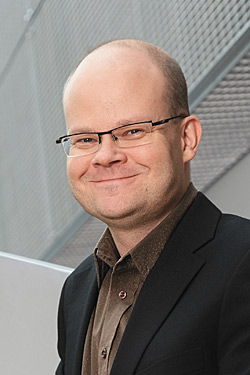Annual Report 2008
An overview of year 2008

While year 2008 was taxing to the department, it was also a very productive year. In addition to the normal teaching and research, the transition period to the new degree system was finalised, the new degree requirements and sub-programme structure were designed and implemented, and we participated in two evaluations of our teaching.
The number of Master's degrees completed was three-fold compared to normal years. The transition period, which ended in summer 2008, caused a veritable flood of Master's theses as older students wanted to finish their degrees before the switch. The department worked to activate its students to finish their degrees, establishing an MSc clinic, among other things. The efforts were substantial: supervision of the theses alone required over four extra person years. Thanks to the team spirit at the department, the undertaking was brought home with flying colours. The department broke the unofficial record of the university in the increase in Master's degrees and theses. Just during the spring term, 194 Masters graduated from the department, while in a normal spring, the number of graduates has been just slightly above 50.
The new sub-programme structure and degree requirements of the department were designed during the winter and spring, and came into force from the beginning of autumn 2008. There are now three sub-programmes at the department: algorithms and machine learning, distributed systems and data communications, and software systems. Now the teaching at the department is grouped more logically than before, and the new sub-programmes correlate more clearly with the focuses of research at the department. One of the principles while renewing the degree was, indeed, to further base the MSc-level teaching on the strengths in research at the department. The Department of Computer Science also has two international Master's programmes, in bioinformatics (MBI) and information and communications technology (CBU-ICT).
The Finnish Higher Education Council re-elected the department as a national centre of excellence in higher education, this time for the years 2010-2012. The centre of excellence status is the result of long-term, consistent development of teaching and learning, such measures as creating learning-goal matrices for courses in connection with the new syllabus, removing some bottlenecks in degree progress, and supporting student-centred activities - both the multifaceted activities of the student union TKO-äly to support learning and the course organised by the new Lambda society - were taken during the past year. The status of centre of excellence is a significant achievement. It was only conferred on 10 units in Finland this time, and the department was one of two units that were selected for their second period. During 2008, the leadership and management of education in faculties were also assessed in the university's own evaluation.
One of the highlights of year 2008 was the organisation of the internationally most significant machine-learning meeting. In fact, the department organised the three leading conferences in this field, ICML, UAI and COLT, at the same time, along with 12 workshops. During nine days, over 800 scientists from around the world participated. Being given the organisation responsibility of these events is an indication of the international recognition of machine learning and data mining research at the department.
In addition to the renewed sub-programme structure mentioned above, the department is constantly remodelling itself in various ways. During this year, five professorships, two lecturerships, many fixed-term posts of university teacher, post-doc researcher, and doctoral student, two posts of university teacher, and the posts of office manager and research coordinator were in the appointment process. The department is further being reformed through various projects initiated by the staff and funded by the department. The projects entail such measures as improving teaching methods and software, further refining research findings, opening up new fields of research, supporting research administration, upgrading the web site, and investing in the physical well-being of the staff.
The planned university reform will revolutionize academia and its structures. The department has style and standards, and it has already responded proactively to many new challenges. The staff and students of the department deserve warm thanks for their high-quality work and active and diversified participation in the department's operations!
Hannu Toivonen
Head of the Department
